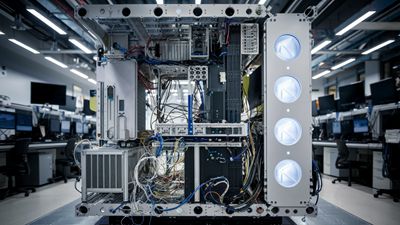MarketLens
Is IonQ Leading the Quantum Revolution? How Major Deals Are Powering Explosive Growth
IonQ, a prominent developer of trapped ion quantum computers, has made significant strides in the quantum computing industry. This report examines IonQ’s recent achievements, including a substantial $54.5 million contract with the U.S. Air Force Research Lab (AFRL) and its year-to-date (YTD) bookings of $72.8 million. The report delves into IonQ’s technological advancements, financial performance, market position, and strategic partnerships, providing a comprehensive analysis of whether IonQ is indeed leading the quantum revolution.
Introduction
Technological Advancements
Trapped Ion Technology
IonQ’s core technology revolves around trapped ion quantum computing, which uses individual ions suspended in a vacuum as qubits. This approach offers several advantages over other quantum computing technologies, such as superconducting qubits used by competitors like IBM and Google. Trapped ion systems are known for their high fidelity, long coherence times, and precise control, making them one of the most stable quantum computing technologies available.
In 2024, IonQ achieved a significant milestone by surpassing 99.9% fidelity on two-qubit gates using barium ions. This accomplishment represents a crucial advancement towards practical, commercial quantum solutions. The shift from ytterbium ions to barium ions has provided IonQ with higher native fidelity limits, increased gate speeds, reduced state preparation/measurement errors, and better overall stability.
Quantum Systems
IonQ’s flagship quantum system, IonQ Forte, features 36 algorithmic qubits and is part of a portfolio that includes upcoming systems like IonQ Tempo, which is expected to offer 64 qubits by 2025. The company is also exploring quantum networking with photonic interconnects, allowing for modular expansion of their systems. This could enable scaling up to hundreds or thousands of qubits more efficiently than many competitors.
Financial Performance
Revenue Growth
IonQ has demonstrated robust financial growth since going public in 2021. The company has nearly doubled its revenue each year, with a compound annual growth rate (CAGR) of almost 100% for sales (bookings) and approximately 225% for recognized revenue. As of September 2024, IonQ announced $72.8 million in bookings year-to-date, with a target of achieving between $75-95 million in total bookings for the year.
Stock Performance
IonQ’s stock (NYSE: IONQ) experienced a significant surge of 20.5% on heavy volume following the announcement of the $54.5 million contract with the U.S. Air Force Research Lab. However, the stock also faced volatility, trading down 7.8% during mid-day trading on October 1, 2024. Despite this fluctuation, analysts have issued mixed ratings on IonQ, with a consensus rating of “Moderate Buy” and an average target price of $13.00.
Financial Challenges
Despite impressive revenue growth, IonQ has faced financial challenges. In 2023, the company generated $22.04 million in sales, a sharp increase from $11.1 million the previous year, but incurred a net loss of nearly $158 million. The company’s market capitalization stands at approximately $1.73 billion, with a P/E ratio of -9.94 and a beta of 2.04. Analysts project a negative EPS of -0.84 for the current fiscal year.
Strategic Partnerships
Government Contracts
The $54.5 million contract with the U.S. Air Force Research Lab is a significant milestone for IonQ, enhancing its credibility within the quantum computing industry. This contract focuses on advancing quantum networking compatibility, interoperability with existing telecommunications infrastructure, and system deployability. IonQ’s strong partnerships with government agencies, including a multi-million-dollar extension of its contract with Amazon Web Services (AWS) and a $9 million deal with the University of Maryland, further solidify its market position.
Commercial Collaborations
IonQ has established partnerships with major companies and organizations, including Airbus, Hyundai, Microsoft Azure, Amazon Braket, and the Air Force Research Lab. These collaborations aim to apply quantum solutions across various industries, enhancing IonQ’s market presence compared to competitors. The company’s systems are available through major cloud providers, making quantum computing technology more accessible to developers and researchers.
Market Position
Competitive Landscape
IonQ operates in a competitive landscape alongside major players like IBM, Intel, Alphabet (Google), and Honeywell. Each of these companies employs different approaches to quantum computing, with IBM and Google focusing on superconducting qubits, Intel on silicon spin qubits, and Honeywell on trapped ion technology through its division, Quantinuum.
Market Capitalization and Investment Ratings
IonQ’s market capitalization of approximately $1.73 billion is significantly smaller than that of its competitors. For instance, IBM’s market cap stands at $116.85 billion, Intel at $138.89 billion, Alphabet at $1.54 trillion, and Honeywell at $132.79 billion. Despite this disparity, IonQ has received favorable investment ratings, with major investment firms listing it as a ‘Buy.’
Technological Edge
IonQ’s trapped ion technology offers several advantages over its competitors’ approaches. The high fidelity, low error rates, and scalability potential through quantum networking position IonQ as a competitive player in the quantum computing market. The company’s focus on achieving commercial viability with its quantum systems within the next two years further strengthens its market position.
Conclusion
IonQ has made significant strides in the quantum computing industry, driven by technological advancements, robust financial growth, strategic partnerships, and a competitive market position. The $54.5 million contract with the U.S. Air Force Research Lab and the year-to-date bookings of $72.8 million underscore IonQ’s leadership in the quantum revolution. Despite financial challenges and market volatility, IonQ’s trapped ion technology, high fidelity, scalability potential, and strong commercial collaborations position it as a key player in the quantum computing market.
In conclusion, IonQ is indeed leading the quantum revolution, fueled by major deals and technological advancements. The company’s focus on achieving commercial viability and expanding its market presence through strategic partnerships and government contracts further solidifies its position as a frontrunner in the quantum computing industry. As the quantum computing market continues to grow, IonQ’s innovative approach and strong market position are likely to drive further growth and investor interest in the company.
Related Articles
Category
You may also like
No related articles available
Breaking News
View All →No topics available at the moment






